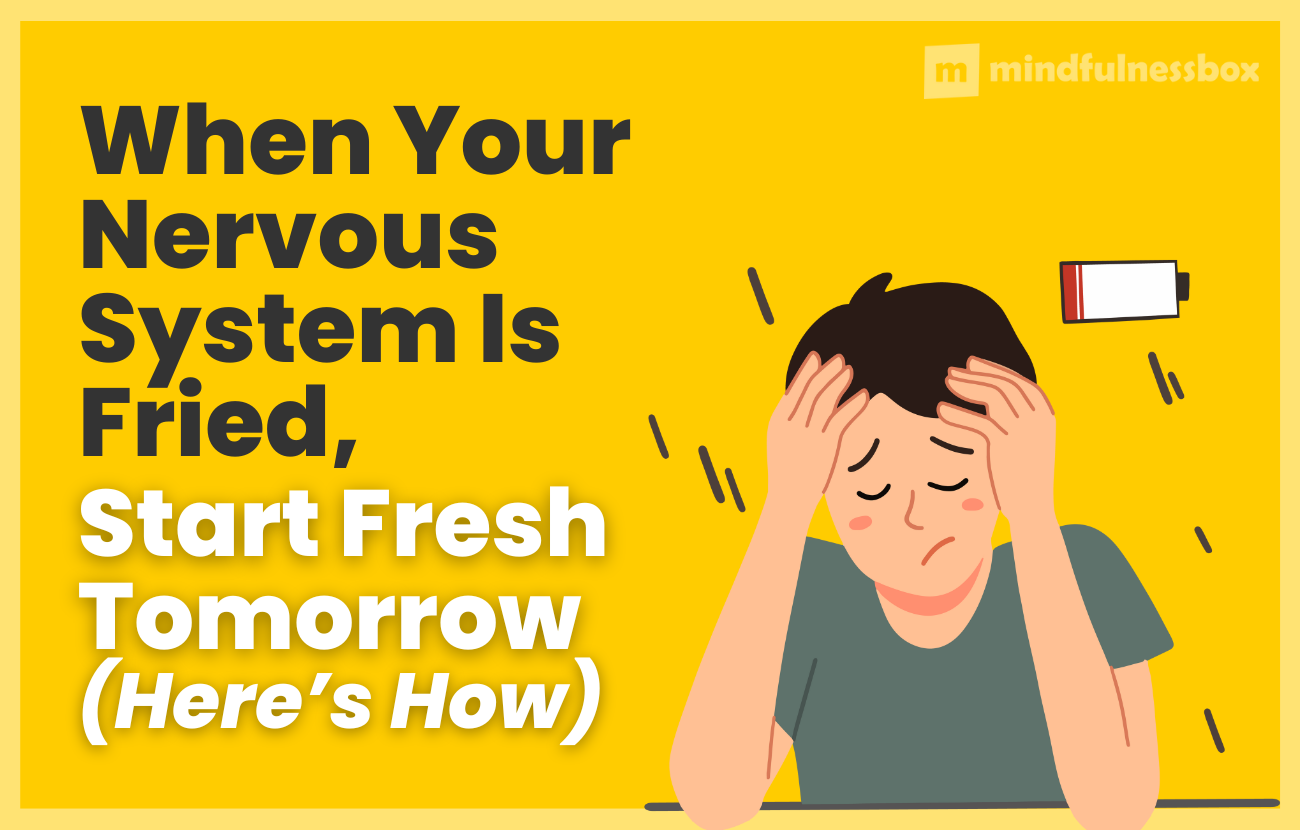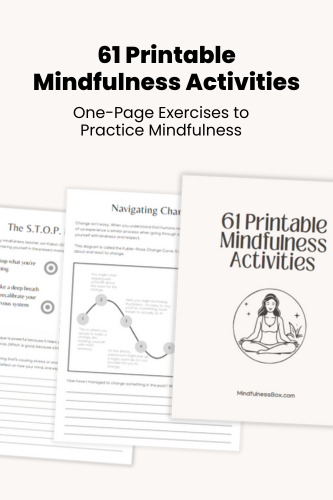Let me paint a picture for you:
It’s 9:00pm after a long day of work, chores, and childcare. The dishes are piling up, and meanwhile, I only got 40% of my to do list done. Vague feelings of unaccomplishment are replacing the optimism I had in the morning.
Try as I might, I can’t nudge myself back into a good mood.
Get dozens of one-page exercises to help practice mindfulness, meditation, gratitude, and self love. Perfect for printable handouts when teaching mindfulness to groups, students, or in the workplace.
To see examples, plus a full list of the 61 exercises included, click below.
I’m fried.
As all couples do, my wife and I have developed a shared language over time. And one of those phrases has been invaluable:
“I’m just gonna try again tomorrow.”
When I say that, she knows what I’m requesting: permission to tap out, zone out, and let go of the pressure to be my best self. If my energy is zapped, “forcing it” and trying to behave normally (rather than calling out my low battery) only results in inauthentic interactions and frustration.
Of course, this idea is nothing new.
The philosophy of Trying Again Tomorrow™ has a long legacy.
Jim Croce, a favorite songwriter of mine, was clearly a fan of optimism towards tomorrow with his 1972 song “Tomorrow’s Gonna Be a Brighter Day.” (‘Cause tomorrow mornin’ everything will turn out right).
But the spirit of the idea is captured best by the classic musical Annie:
When I’m stuck with the day, that’s grey, and lonely
I just stick out my chin and grin and say
The sun will come out, tomorrow
So you gotta hang on till tomorrow
Cognitive fatigue and the fallacy of “mind over matter”
In 2011, researchers studied hundreds of judicial decisions and found that the judges’ decisions changed when they were tired.
(What?!)
Judges were more likely to approve parole requests in the morning when they were fresh, and more likely to deny them later in the day, when they were low on energy.
For years, a popular strain of self-help literature celebrated positive thinking and “mind over matter.” (Cue those cheesy inspirational posters: ”If you can believe it, then you can achieve it!”).
But now, that era is coming to an end.
We know that our minds aren’t always in charge. Instead, there is a dense interplay between emotions and the body:
- Trauma is stored in your somatic memory and expresses itself physiologically.
- Meanwhile, your gut can affect your central nervous system, which in turn affects your mood.
Yes, your mind can affect your body and your mood, but the reverse is also true. And understanding the impact of your body on your mind may be even more important when navigating your day-to-day life.
How to know when to try again tomorrow
This brings us back to the my occasional 9:00pm low-battery struggles and the accompanying decision to throw in the towel and try again tomorrow.
I’ll confess something:
From an ego perspective, this can be hard. Sometimes, it feels like giving up. It’s tough to admit that, try as you might, you can’t nudge your body and mind in the right direction.
It’s also tough because sometimes, it feels selfish. Tapping out for the day when you still have responsibilities (see: childcare, chores, etc) isn’t always an option. It may put a burden on others in your family.
Here’s are three signs that you need to stop trying to push through, and instead, take a break until tomorrow:
- You’re trying to endlessly psychoanalyze yourself. You’re going in circles and can’t figure out what’s wrong.
- The normal tricks to make yourself feel better aren’t working. Going for a run, talking to a friend, getting some “me time”—none of it helps.
- You’re starting to feel bad about feeling bad. You’re frustrated that you can’t pull yourself back into “normal mode.”
Sometimes, your nervous system is just fried. Your body is worn out. No mental pep talks are working—nothing you say or do will get you back to 100%, or even 80%.
When that happens, it’s time to start fresh tomorrow.
Be gentle with yourself. Put off any responsibilities, commitments, and obligations that you can. Allow yourself to zone out, get to sleep as quickly as possible, and trust that the jumble of thoughts in your head will align themselves into something coherent by morning.
Rest first, and everything else will follow.

My mindfulness practice kicked off in 2016 with a ten-day silent retreat. Since then, I’ve read dozens of books about mindfulness and completed hundreds of hours of meditation. Thinking about what makes humans happy, calm, and peaceful is endlessly fascinating to me.


